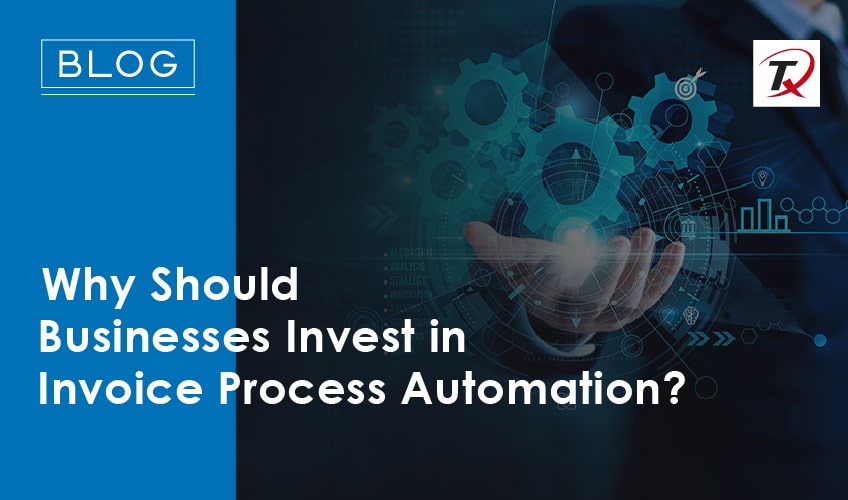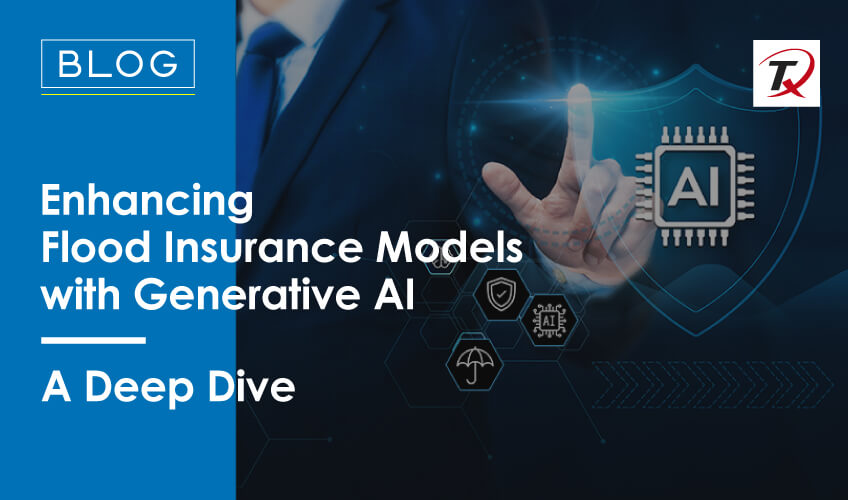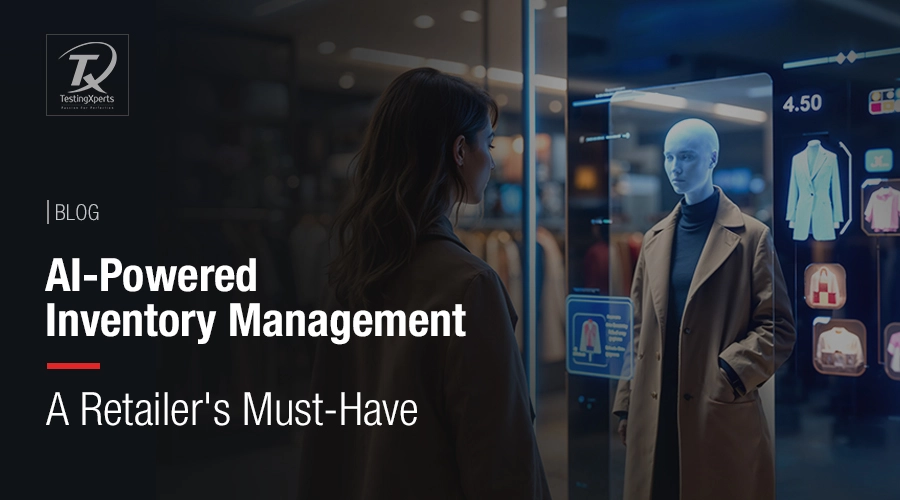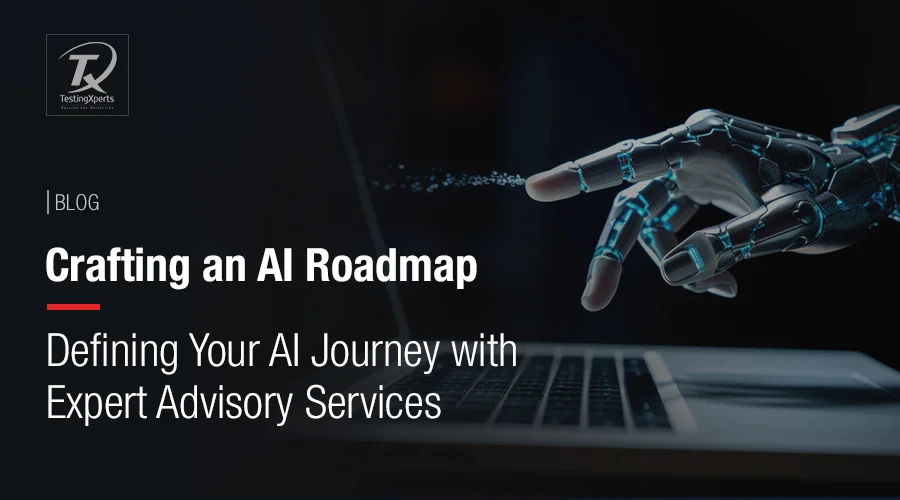
AI is not a silver bullet, but a tool to shape, optimize, and transform your business. To succeed, you need a clear path—a roadmap.”
- Why Businesses Need an AI Roadmap: Understanding the Pain Points
- Step 1: Assessing Readiness – The Foundation of Your AI Journey
- Step 2: Defining Business Goals and Selecting Use Cases
- Step 3: Crafting a Scalable AI Implementation Plan
- Step 4: Digital Assurance – Ensuring Quality and Compliance
- Step 5: Digital Engineering – Building Resilient, Scalable Solutions
- Tx Accelerators and Frameworks: Powering AI Implementation with Agility and Security
- Conclusion: Set the Path with a Clear AI Roadmap
Businesses are now eager to dive into Artificial Intelligence (AI), due to its potential use for automation, data-driven decision making, and enhanced customer experiences. For most companies, the challenge is beyond its implementation. It is about understanding the groundwork required to implement it and then how to implement it within their existing ecosystem. With the increasing complexities of digital transformation, businesses need a clear roadmap. This is where expert advisory and consulting services come into play.
Tx advisory services are designed particularly to guide businesses on their AI journey. From assessing readiness to defining strategic use cases, we pay attention to AI roadmap that aligns with your unique business goals. Through our digital assurance and digital engineering practices, we work with organizations, ensuring their AI implementation roadmap integrates seamlessly into existing operations and delivers the expected impact.
Why Businesses Need an AI Roadmap: Understanding the Pain Points
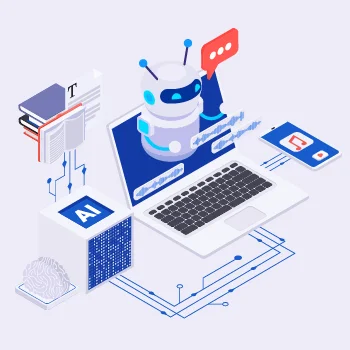
With all the potential of AI, many organizations struggle with understanding how to start AI implementation. They often are not sure about the technical insight and strategic guidance required to identify which AI solutions are aligning best with their needs. Without this understanding, enterprises risk misallocating resources, implementing fragmented solutions, or facing expensive delays in realizing AI’s advantages. An AI roadmap assists mitigate these risks by answering the key questions:
- What is the best use for AI within my business?
- How does AI fit within the existing technology and workflows?
- What infrastructure changes are required?
- What are the resources needed, both technical and human?
Expert consultation services, when designed, help businesses address these critical questions, creating a roadmap which constitutes everything from data readiness and technology compatibility to team skills and resource allocation.
Step 1: Assessing Readiness – The Foundation of Your AI Journey

The initial step in crafting an AI roadmap is assessing where your organization currently stands. Advisory services pay attention to the readiness assessment that looks at your infrastructure, data maturity, talent, and cultural alignment with AI technology. Our approach at Tx involves evaluating two key pillars:
Data Readiness
AI is dependent on high-quality, accessible data. Our expert advisors assess if the data is organized, accessible and enough to support AI. Data readiness also involves identifying data sources – whether structured, unstructured, or streaming data – and determining how to structure and cleanse it effectively.
Technology and Infrastructure
AI needs compatible infrastructure. Our advisory team assesses your current technology stack, determining if you need cloud solutions, or new hardware or software integrations to make AI implementation feasible.
After a comprehensive assessment, we offer actionable insights that reveal any gaps required to be addressed before AI can be implemented effectively. This level of readiness is critical as it assists you avoid setbacks, unexpected costs and delays.
Step 2: Defining Business Goals and Selecting Use Cases
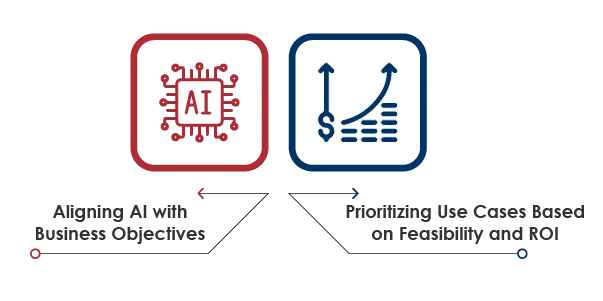
Another key challenge that businesses encounter is selecting the right use cases for AI. At Tx, we help you in identifying the high-impact, and the achievable use cases that align directly with your business goals. Our consultants help in two ways:
Aligning AI with Business Objectives
AI works best when it serves as a measurable entity. For instance, if your goal is to enhance customer experience, AI can be customized to personalize interactions and improve the response times. We help you in avoiding AI implementation “just for the sake of it” by aligning AI initiatives with business requirements, be it revenue growth, customer engagement or process efficiency.
Prioritizing Use Cases Based on Feasibility and ROI
All the projects do not offer the same value or are feasible equally. Tx advisors analyze potential use cases on the basis of expected ROI, implementation time, and available resources, assisting you to prioritize projects that promise the highest impact.
Step 3: Crafting a Scalable AI Implementation Plan

Drafting an AI roadmap does not end with selecting the use cases. It includes designing a scalable plan that ensures progressive and smooth implementation. Tx’s approach includes:
Defining Success Metrics
Advisory services help define the metrics by which AI initiatives will be evaluated. Be it reduced operational costs, increased customer satisfaction, or improved decision-making speed, we make sure that each project has clear performance indicators.
Pilot Projects
We start with pilot projects that allow your organization to test AI on a smaller scale, evaluate how effective it is, and learn without major financial commitments.
Change Management
AI leads to significant changes, and without proper change management, employees may feel uncertain or resistant. Our team offers strategies to integrate AI without disrupting existing workflows. This involves training sessions and workshops to help employees adapt to AI, making sure they view it as a tool that enhances their roles, and not replace them.
Step 4: Digital Assurance – Ensuring Quality and Compliance
Digital Assurance is essential in an AI-driven environment. This helps ensure that the technology operates securely and smoothly. Tx’s Digital Assurance practices focus on quality control and compliance, specifically important for sectors bound by regulatory frameworks like PCI-DSS. Using rigorous testing and validation, we ensure AI solutions perform consistently and meet the industry standards. This reduces risks, ensuring that your AI applications deliver compliant and reliable results.
Step 5: Digital Engineering – Building Resilient, Scalable Solutions
Digital Engineering is vital for implementing AI solutions that are resilient, scalable and future proof. At Tx, we use our expertise in Digital Engineering to create robust architectures that support seamless AI integration. This includes data engineering to infrastructure development. We design AI solutions that scale with your business, evolving to meet the changing requirements and growing demands. This engineering approach helps prepare your AI infrastructure for long-term success.
Tx Accelerators and Frameworks: Powering AI Implementation with Agility and Security

Tx AI based frameworks and Accelerators like Tx-Automate, Tx-HyperAutomate, Tx-SmarTest, etc. are the flagship offerings. These play a huge role in AI implementation. Designed with a focus on compliance and cybersecurity, Tx accelerators are equipped with PCI-DSS compliance standards. This helps clients implement AI securely and responsibly. These accelerators ensure that AI projects are agile, quickly deployable, and compliant with industry standards. This makes it a deal for businesses wanting to implement AI without compromising on security or speed.
The Tx Advantage: Comprehensive Advisory and Consulting Services
At Tx, our consulting and advisory services are involved at every step of the AI journey. Our approach is rooted in years of expertise in Digital Assurance and Digital Engineering, making us well-equipped to guide through the AII implementation process. Here’s how we contribute the value at each stage:
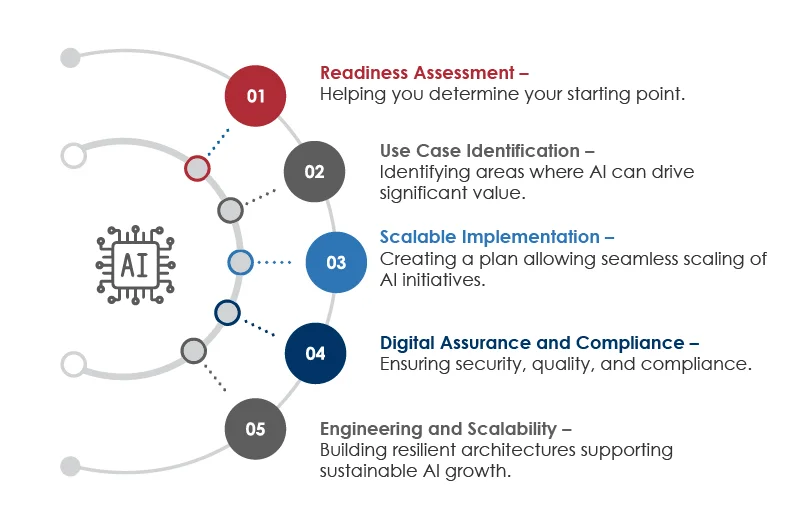
Conclusion: Set the Path with a Clear AI Roadmap
Implementing AI is becoming a necessity for staying competitive. But, without a clear roadmap, businesses risk wasting valuable resources and face integration challenges. Advisory services are important in navigating this journey, assisting organizations build a strategy that aligns with their goals, long-term vision, and their goals.
At Tx, we’re committed to empowering businesses on their AI journey, from the initial readiness assessment to its implementation. Our advisory services, backed by our Digital Assurance and Digital Engineering practices, make sure that AI is the core driver of growth, security, and efficiency within your organization.
Ready to start your AI journey? Contact Tx today to explore how we can help define and execute an AI roadmap tailored to your business needs.
Discover more
Get in Touch
Stay Updated
Subscribe for more info


